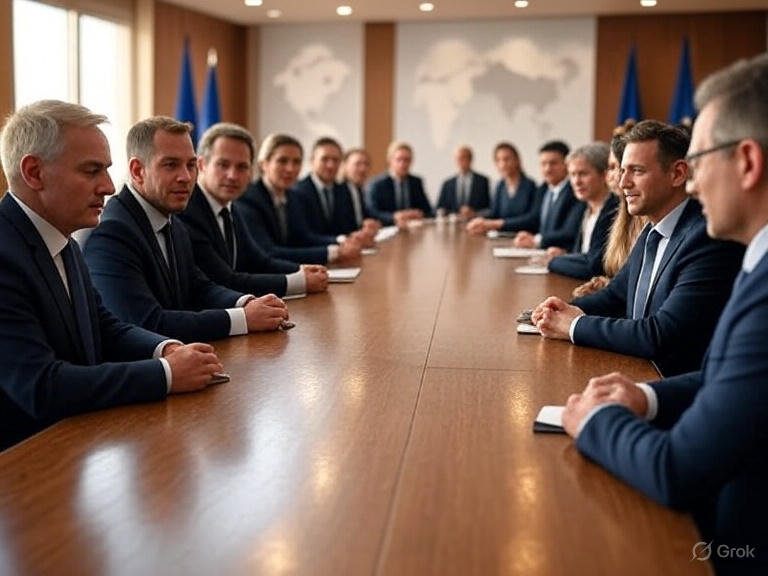Introduction: Why the Political and Security Committee Matters
Are you curious about how global security decisions are made? The Political and Security Committee (PSC) plays a pivotal role in shaping the European Union’s approach to international peace and stability. In this guide, we’ll explore its functions, significance, and how it impacts global politics—perfect for policy enthusiasts, researchers, and students eager to understand international relations.
What Is the Political and Security Committee?
The Political and Security Committee, often abbreviated as PSC, is a key body within the European Union (EU) responsible for overseeing its Common Foreign and Security Policy (CFSP). Established under the Treaty of Amsterdam in 1997, it acts as a bridge between EU member states and the EU’s external action services. The PSC ensures that the EU’s foreign policy aligns with its security goals, making it a cornerstone of European diplomacy.
Key Responsibilities of the PSC
The PSC handles critical tasks that shape the EU’s global presence. Its work is both strategic and operational, ensuring the EU responds effectively to international challenges. Here’s a quick overview:
-
Monitoring global crises: Tracks conflicts and crises to recommend EU action.
-
Policy coordination: Aligns member states’ positions on foreign policy issues.
-
Overseeing missions: Manages EU peacekeeping and crisis management operations.
How the PSC Shapes EU Foreign Policy
The PSC is at the heart of the EU’s decision-making process for foreign policy and security. It meets regularly to discuss pressing global issues, from conflicts in Ukraine to tensions in the Middle East. By providing strategic guidance, the PSC ensures the EU speaks with one voice on the world stage.
Decision-Making Process
The PSC operates under the Council of the European Union, reporting to the Foreign Affairs Council. Ambassadors from each member state participate, ensuring diverse perspectives. Their decisions influence everything from sanctions to humanitarian aid.
Collaboration with Other EU Bodies
The PSC works closely with the European External Action Service (EEAS) and other EU institutions. This collaboration ensures seamless coordination between diplomatic efforts and security operations. For example, the PSC played a key role in shaping the EU’s response to Russia’s actions in Ukraine.
The PSC’s Role in Global Security
Global security is a top priority for the PSC, as it addresses threats like terrorism, cyberattacks, and hybrid warfare. The committee’s work helps maintain stability in volatile regions. Its influence extends beyond Europe, impacting international peacekeeping efforts.
Crisis Management and Peacekeeping
The PSC oversees EU-led missions, such as peacekeeping operations in Africa and the Middle East. These missions aim to stabilize conflict zones and support local governments. For instance, the EU’s mission in Mali focuses on training local forces to combat terrorism.
Tackling Hybrid Threats
In today’s world, security threats are evolving. The PSC addresses hybrid threats, such as disinformation and cyberattacks, which combine traditional and digital warfare tactics. The EU-NATO Task Force, for example, has highlighted the PSC’s role in countering these challenges.
Why Policy Enthusiasts Should Care About the PSC
For those passionate about international relations, the PSC offers a fascinating lens into global diplomacy. Its decisions shape how the EU navigates complex geopolitical landscapes. Understanding the PSC can provide valuable insights for researchers, students, and policymakers.
Opportunities for Engagement
Want to dive deeper? Here are ways to stay informed about the PSC’s work:
-
Follow EU publications: Check the EEAS website for updates on PSC activities.
-
Join policy discussions: Engage in forums or academic groups focused on EU politics.
-
Explore related topics: Learn about the CFSP or EU-NATO cooperation for a broader perspective.
Internal Link Suggestion: Read our article on “How the EU Shapes Global Diplomacy” for more insights.
Challenges Facing the Political and Security Committee
Despite its influence, the PSC faces significant challenges. Coordinating 27 member states with diverse interests is no easy task. Additionally, navigating global power dynamics requires careful diplomacy.
Balancing National and EU Interests
Each EU member state has its own foreign policy priorities. The PSC must find common ground to ensure unified action. This balancing act is critical for maintaining the EU’s credibility.
Adapting to New Threats
Emerging threats, like climate-driven conflicts or technological warfare, demand innovative responses. The PSC must stay ahead of these trends to remain effective. For example, addressing plastic pollution’s impact on global stability is a growing concern.
Conclusion: Stay Informed and Engaged
The Political and Security Committee is a vital player in shaping the EU’s role in global peace and security. By understanding its functions, policy enthusiasts can better grasp the complexities of international relations. Dive into EU publications, join policy discussions, or explore our related articles to stay informed!
Call-to-Action: Are you ready to learn more about global diplomacy? Subscribe to our newsletter for the latest insights on the PSC and EU foreign policy!



